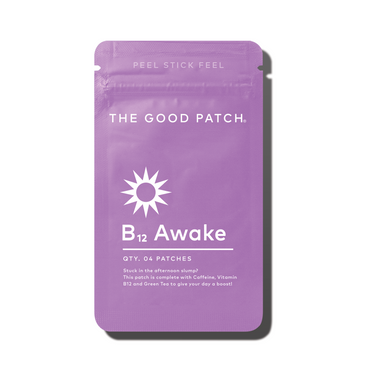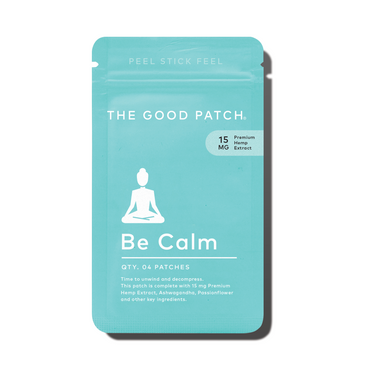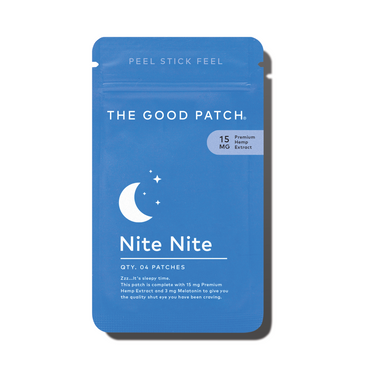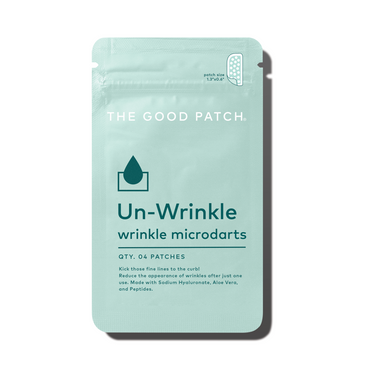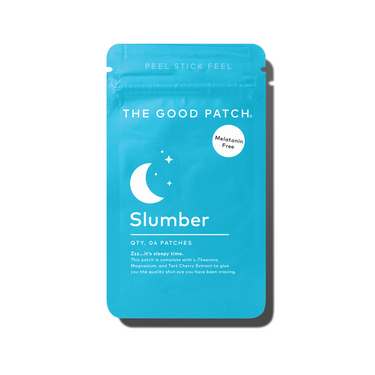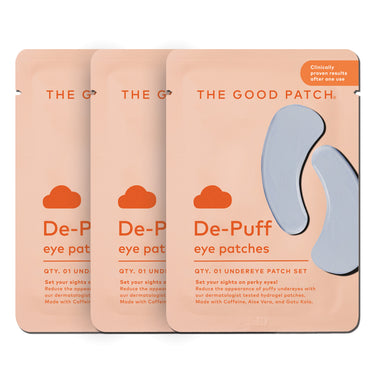Waking up with puffy eyes can be more than just a cosmetic concern — it's a universal sign that your body is trying to tell you something. Whether it's a cry for more ZZZs or a nudge about last night's salt binge, those tell-tale bags are our little windows into the well-being of our bodies.
At The Good Patch, we get it; life happens, and sometimes, it leaves a mark, quite literally, under your eyes. So, let’s deflate the myths and puff up the facts about what's really going on beneath those peepers!
1. Poor Sleep: The Nighttime Culprit
Let's face it: those late-night Netflix binges or hours spent scrolling through social media can lead to a less-than-ideal amount of shut-eye. Lack of sleep doesn't just leave you reaching for that extra cup of coffee; it's also a prime suspect in the case of puffy eyes.
When you skimp on sleep, your body goes into stress mode, causing blood vessels under your thin, under-eye skin to dilate and give a puffy, dark appearance.
Tips:
- Prioritize a full night of restful sleep, aiming for the golden seven to nine hours.
- Establish a calming bedtime ritual — maybe a book instead of a screen?
- Integrate our Dream Patch into your nighttime routine. Infused with Melatonin, Hops, and Valerian Root, it's like a lullaby for your skin, helping you drift off to dreamland while supporting your under-eye area.
2. Fluid Retention: Water, Water Everywhere
Ever noticed how your eyes go from “just fine” to “morning puffiness” overnight? That’s often fluid retention playing its sneaky part.
Your body tends to hold onto water for various reasons — from that extra salty dinner to hormonal changes. This excess fluid can settle in delicate areas like your lower eyelids, leading to that puffy look when you wake up.
Tips:
- Keep an eye on your salt intake. Less salt can mean less water retention.
- Stay hydrated — it sounds counterintuitive, but drinking enough water helps your body maintain a healthy fluid balance.
- Gentle morning rituals, like applying a cool compress or using chilled cucumber slices, can work wonders in reducing eye puffiness.
3. Allergies: Nature’s Curveball
Seasonal allergies, pet dander, or even a cloud of dust can send your immune system into overdrive, resulting in swollen, puffy eyes. This allergic reaction, a common cause of periorbital edema, swells the blood vessels in your eye area, leading to that all-too-familiar puffy look.
And if you're grappling with pink eye (conjunctivitis) or a stye, expect the puffiness to be a loyal, albeit unwelcome, companion.
Tips:
- Over-the-counter antihistamines can be a savior when it comes to reducing your body's eye allergies.
- Eye drops formulated for allergies can soothe irritated eyes.
- Home remedies like a cool compress or damp washcloth over the eyes can offer instant relief.
4. Medical Conditions: More Than Meets the Eye
Sometimes, puffy eyes are a signpost pointing to underlying health conditions. Thyroid disorders, sinus infections, or even dermatological concerns like eczema can manifest as swelling in the under-eye area.
Conditions like cellulitis or blepharitis can also lead to swollen eyelids, demanding more than just cosmetic attention.
Tips:
- Regular check-ups with a healthcare provider can help identify and manage any underlying medical conditions.
- Following prescribed treatments for these conditions is crucial, as they often play a significant role in reducing eye puffiness.
- Gentle, soothing eye creams can provide relief and support the delicate skin in the under-eye area.
5. Lifestyle Choices: Your Daily Habits Under the Microscope
Our daily habits and choices can either be our allies or foes in the battle against puffy eyes. Excessive alcohol consumption, smoking, and even exposure to environmental irritants can exacerbate the issue.
On the flip side, making lifestyle changes such as reducing alcohol and tobacco use can significantly improve the situation.
Tips:
- Aim for a balanced lifestyle with reduced alcohol and tobacco consumption.
- Incorporate physical activities into your routine to improve overall circulation.
- Protect your eyes from environmental irritants with appropriate eyewear, and maintain clean living spaces to reduce exposure to potential allergens.
6. Environmental Factors: The World Around Us
Your environment can be an invisible culprit behind those puffy eyes. Pollutants, extreme weather conditions, and even the air quality in your home or office can lead to swollen eyes.
For instance, high winds can dry out your eyes, while pollution can lead to irritation and swelling. Even prolonged exposure to screens can strain the delicate under-eye area.
Tips:
- Shield your eyes from harsh environmental elements with protective sunglasses.
- Keep indoor air clean and moist — consider using a humidifier in dry environments.
- Take regular breaks from screen time to reduce eye strain and under-eye puffiness.
7. The Aging Process: Time’s Influence
As we age, our skin naturally loses collagen and elasticity, particularly around the delicate under-eye area. This process can lead to the skin sagging and forming eye bags, often contributing to a puffy appearance. Additionally, the fat pads under our eyes can shift over time, exacerbating the look of puffiness.
Tips:
- Support your skin’s health with products that support your body’s natural collagen production. Our Brighten Up patches are infused with skin-loving ingredients to give your under-eye area some extra lovin’.
- Maintain a consistent skincare routine, focusing on gentle and hydrating products.
- Healthy lifestyle choices, including adequate hydration and nutrition, play a vital role in maintaining skin elasticity.
8. Diet and Hydration: The Role of Nutrition
What you eat and drink has a direct impact on your eye health. Diets high in salt can lead to fluid retention, contributing to under-eye puffiness.
On the other hand, a well-balanced diet rich in vitamins and antioxidants can support skin health and reduce the appearance of swollen eyes.
Tips:
- Monitor your salt intake to manage fluid retention better.
- Ensure you’re getting plenty of hydrating fluids throughout the day. Herbal teas can be a great addition to your hydration routine.
- Include fruits and vegetables rich in antioxidants in your diet to support overall eye health and reduce puffiness.
9. Stress: The Silent Aggravator
In our fast-paced world, stress is almost a given, but its effects on our body can be quite surprising, particularly around the eyes. Elevated stress levels can disrupt your sleep and hormonal balance, often leading to noticeable puffiness under the eyes.
Tips:
- Engage in stress-reduction activities like yoga or meditation to help calm both mind and body.
- Introduce our Relax Patch into your relaxation routine. Infused with plant-powered ingredients like Ashwagandha and Rhodiola, it’s designed to give you that chill feeling, giving your eyes and your mind a break.
- Prioritize getting enough sleep, as rest is crucial in managing stress and maintaining overall eye health.
Conclusion
Puffy eyes and dark circles can be a window into our overall health and well-being, revealing clues about our lifestyle, environment, and even our genetic predispositions.
At The Good Patch, we understand that tackling puffy eyes goes beyond cosmetic concerns. It's about embracing a holistic approach to wellness.
Whether it's integrating our Brighten Up patches into your skincare routine or making lifestyle changes for better sleep and reduced stress, every small step can lead to brighter, healthier-looking eyes.
Remember, it's not just about looking good — it's about feeling good, too. Let's journey together toward a lifestyle that celebrates wellness in every aspect, one patch and one day at a time.
Sources:
How to Get Rid of Bags Under Your Eyes | Cleveland Clinic
Fluid retention (oedema) | Better Health Channel
Air pollution and eye health – how does it affect your sight? | Airly


